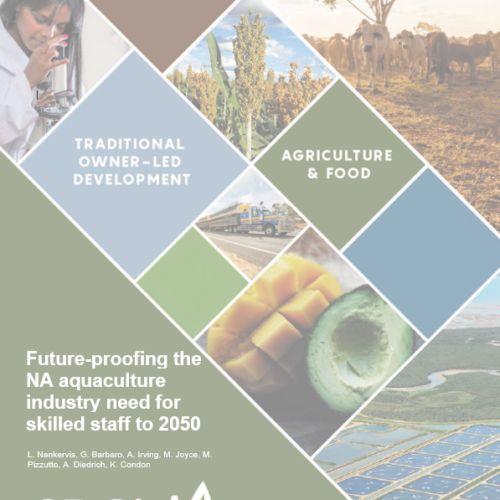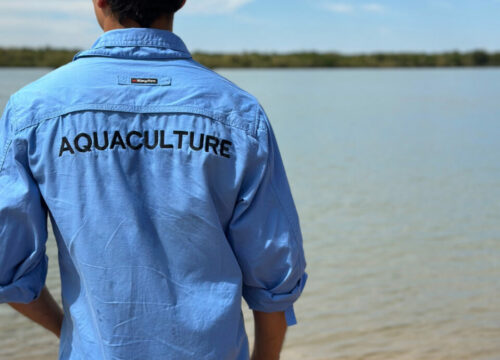
- Author Nankervis,L., Barbaro, G., Irving,A., oyce,M., Pizzutto,M.,Diedrich,A., Condon,K.
- Publish date 5 October 2022
- Type Report
- ISBN 978-1-922437-39-6
- Documents
- Aquaculture
Summary
The aquaculture industry in Northern Australia (NA) is undergoing a period of unprecedented growth, precipitating an increasing demand for skilled staff. To facilitate this growth, the industry requires an increasing stream of suitably skilled and qualified entrants to the industry workforce. Prior to this project, the extent to which educational models aligned to industry requirements was unclear, in terms of graduate knowledge and skills, but also in terms of graduate numbers. In designing the project Future-proofing the Northern Australia aquaculture industry need for skilled staff to 2050, the project team from James Cook University sought to address this alignment, while also identifying barriers to cost-effective delivery of vocational training for the Northern Australian aquaculture industry and investigating new training models that may assist.
Quantitative and qualitative data on skills and roles in the Northern Australian aquaculture production industry were sourced via structured interviews and questionnaires. The project team used this data to define three categories of employment across the sector thus informing the development of educational resources and materials as well as recommendations around how the industry needs to work harder to increase its attractiveness and awareness for new entrants as well as retaining staff that currently work within the industry.
This report concluded on-farm vocational education remains a central pillar of existing workforce skill development and staff retention, but as the industry grows, retention will be increasingly dependent on a structured approach to career development, including job satisfaction, skill development and remuneration.
The project has contributed digital training modules that are envisaged to support Registered Training Organisations and universities train the next generation of aquaculture staff and engage new entrants to the industry. These are not intended to supplant existing training models and the value of face-to-face training and assessment cannot be over-emphasised.
Projects
Future-proofing the NA aquaculture industry need for skilled staff to 2050
The Northern Australia aquaculture industry will need between 1400 and 2300 new skilled staff by 2030 to support projected industry growth. The CRCNA’s Northern Australia aquaculture situational analysis identified challenges in the shortage of domestic skilled and experienced aquaculture staff and on-farm biosecurity and health management capacity building across the north. The report also captured the concerns of producers about their requirements to build skills to meet industry growth needs, including professional development for current staff, aligning training with industry needs and promoting career opportunities in the northern Australian aquaculture industry among regional communities. This project defined the industry’s need for specific skills and education levels, mapped existing training and education providers and proposes improved models for education and training delivery. By evaluating industry workforce needs currently and into the future and analysing the gaps between industry need and educational output, the project has identified gaps in careers pathways to meet future industry requirements. These careers pathways will form the basis of promotional tools created to highlight education and skills development options that lead secondary students into the aquaculture industry. Cost-effective delivery models for training will be key to the outcomes of the project and a pilot project to up-skill existing industry employees in biosecurity will be used to develop and de-bottleneck new training delivery models.


